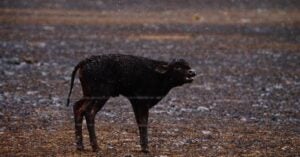Republican U.S. Sen. Ted Cruz and Republican U.S. Rep. Ronny Jackson introduced Senate and House versions of the Livestock Indemnity Program Enhancement Act to help Texas livestock producers recover from the devastating wildfires that occurred in the Texas Panhandle earlier this year.
This bill would require the U.S. Department of Agriculture to establish an additional payment rate through the Livestock Indemnity Program for excessive unborn livestock death losses due to gestating livestock losses. The recent wildfires in the Texas Panhandle caused over 7,000 cattle losses, not including unborn calves, destroying the livelihoods of hundreds of ranchers and livestock producers in Texas.
“Texas ranchers are the backbone of the Texas agriculture industry. After wildfires engulfed the Panhandle earlier this year, at least 7,000 cattle perished,” wrote Cruz. “These fires devastated Texas ranchers, who are now struggling to rebuild. I am proud to introduce legislation to strengthen the Livestock Indemnity Program. This will give Texas cattle producers the relief they need to build back their herds and restore this pillar of Texas agriculture.”
Initially incorporated into the 2018 farm bill, the Livestock Indemnity Program is administered by the USDA. The program pays livestock producers for additional losses resulting from severe weather, diseases, or specific animal attacks. The Secretary of Agriculture calculates these payments, usually 75 percent of the animal’s average market value.
The program, however, won’t cover the cost of unborn livestock. During the recent wildfires, cattle producers suffered the loss of livestock and their unborn calves.

“Current federal law fails to compensate producers for unborn calves,” said Allison Rivera, executive director of government affairs for the National Cattlemen’s Beef Association. “This legislation would change that.”
The proposed legislation would add a payment for unborn livestock, capped at 85 percent of the market value for the lowest weight class of that animal.
“Their recovery has been set back several years due to the limitations on the program’s ability to compensate for unborn livestock losses,” Jackson said.
According to the Texas House Committee, cattle losses are estimated to be around $27 million, and some pastures may not be suitable for grazing for years.
“As Texas farmers and ranchers continue working to recover from devastating wildfires, it is critical to provide as much assistance and flexibility as possible to help them get back on their feet,” said Russell Boening, president of the Texas Farm Bureau.
»Related: From flames to finances: Steps to wildfire recovery


